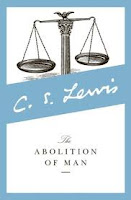 |
| (Amazon UK link) |
I don't, however, remember reading 'The abolition of man' for many years, if at all. It's a slim volume, just three chapters, and is a philosophical and educational book rather than being directly Christian. I should think it was very radical in its day although now, over 60 years since publication, it (naturally) seems a bit outdated.
It basically proposes that moral relativity is illogical, and that there has to be some generally understood life principles. Lewis refers to these, broadly, as the 'Tao', while acknowledging that they encompass all religions and many secular philosophies. While writing from his usual Christian perspective, this is not an argument for God's existence, or even theism in general.
He begins by pulling to pieces some writing in an English grammar text book of the era, in which the authors declare that any value statement reflect nothing more than the emotions of the speaker. Lewis claims that - for instance - a colourful sunset or a majestic mountain peak - is not just beautiful in the eyes of the beholder, but has something inherently beautiful or sublime.
If that is the case, then we should be awestruck and humbled by such sights; not to feel that way, he says, is some kind of failing. He admits that he, himself, does not like the company of small children yet he believes that small children are delightful. So his lack of pleasure in their presence is a failing, in his view, not just a personal preference as valid as anyone else's.
I'm not entirely sure I agree with him, since many value statements are personal. Is it, for instance, morally right to like certain foods? Presumably not, since one culture loves what another hates. Lewis does not address that topic. Moreover he starts with some premises that he assumes are universally acceptable, not all of which I agreed with. I can accept, perhaps, that a glorious sunset 'should' be admired. More easily, I can accept that the elderly should be honoured. I cannot, however, accept that patriotism is always right.
Nor do I see where he makes the leap from 'some traditional principles of life are inherent' into 'if some, then all must be accepted'.
The writing is good, and quite thought-provoking, but since I didn't agree with all his premises I couldn't always follow the arguments fully.. despite agreeing with most of his conclusions. At the end is an interesting appendix listing examples of what Lewis refers to as the 'Tao' from a wide variety of sources- the Bible, Ancient Chinese documents, Roman writings, Greek literature and more.
Worth reading, but I didn't find it as invaluable and mind-blowing as many of the critics suggest.
Review copyright Sue's Book Reviews, 27th February 2010
I'm not entirely sure I agree with him, since many value statements are personal. Is it, for instance, morally right to like certain foods? Presumably not, since one culture loves what another hates. Lewis does not address that topic. Moreover he starts with some premises that he assumes are universally acceptable, not all of which I agreed with. I can accept, perhaps, that a glorious sunset 'should' be admired. More easily, I can accept that the elderly should be honoured. I cannot, however, accept that patriotism is always right.
Nor do I see where he makes the leap from 'some traditional principles of life are inherent' into 'if some, then all must be accepted'.
The writing is good, and quite thought-provoking, but since I didn't agree with all his premises I couldn't always follow the arguments fully.. despite agreeing with most of his conclusions. At the end is an interesting appendix listing examples of what Lewis refers to as the 'Tao' from a wide variety of sources- the Bible, Ancient Chinese documents, Roman writings, Greek literature and more.
Worth reading, but I didn't find it as invaluable and mind-blowing as many of the critics suggest.
Review copyright Sue's Book Reviews, 27th February 2010
No comments:
Post a Comment